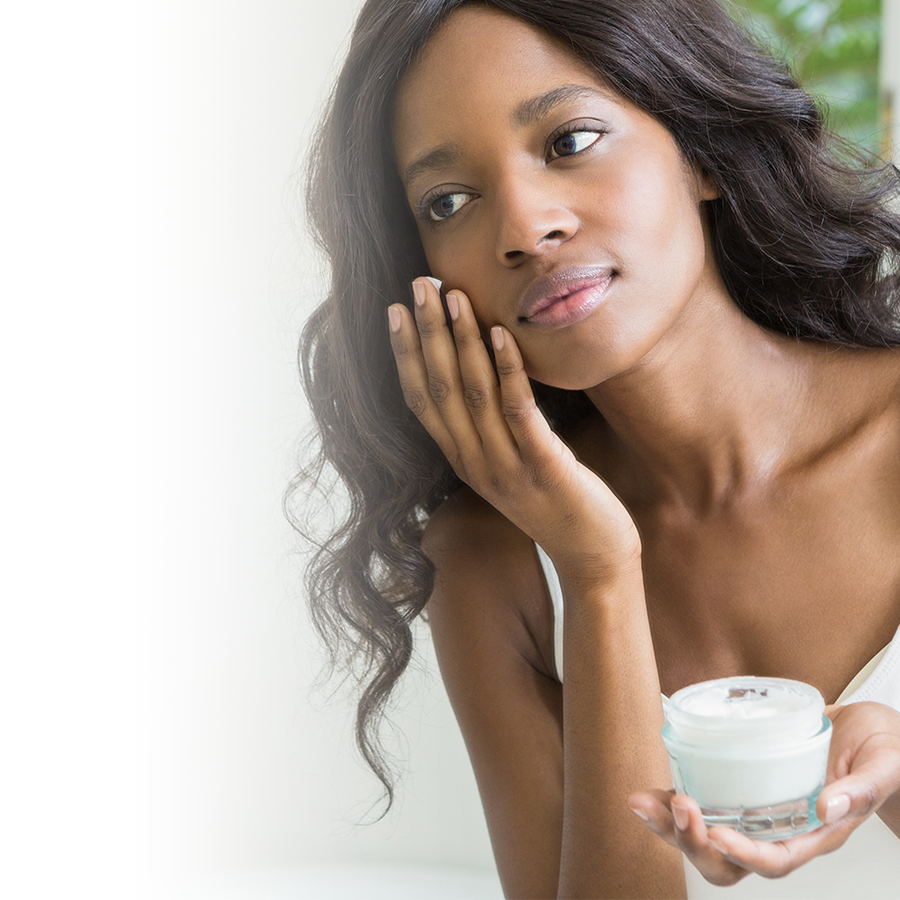Stress, pollution, cold and wind—hypersensitive skin reacts easily to these assaults. A lot of care and attention is needed.
Stress, pollution, cold and wind—hypersensitive skin reacts easily to these assaults. A lot of care and attention is needed.
Some people will tell you that their facial skin is "allergic to everything". In reality, it's a way of saying that their skin reacts strongly to a multitude of factors, but it isn't really an allergy per se. A surprising number of women report having sensitive, intolerant or irritable skin.
We refer to an allergy when the skin reacts to a stimulus or various stimuli (allergens), more specifically by the activation of the immune system. The immune system perceives the presence of an allergen as a threat and triggers an allergic reaction. Manifestations can vary but often include redness, swelling, and significant itching of the skin. The individual sometimes feels pain at the contact site. Other generalized symptoms can also appear: sneezing, coughing, difficulty breathing, etc.
Typical allergens include metals (nickel, chrome, silver, etc.), other materials (latex, rubber, etc.), and certain chemicals (perfumes, cosmetics or preservatives). Individuals who present "a real allergy" have no other choice but to avoid contact with the allergen at issue at all costs.
How to recognize hypersensitive skin
Skin hypersensitivity is characterized by discomfort and strong irritability. The following signs and symptoms may occur:
- tingling
- itching
- burning sensation and/or tightness
- redness
- rash
It isn't uncommon for a person to experience symptoms of hypersensitivity without any visible signs on the skin.
If you think you have hypersensitive or allergic skin, speak to your doctor, who will confirm a diagnosis and help you to identify the factors at issue.
Am I at risk of having hypersensitive skin?
Certain individuals are more susceptible than others. For example, this is the case for people who suffer from certain skin conditions such as acne, rosacea, eczema, and psoriasis. Women are generally more likely to have hypersensitive skin, especially if they have delicate skin or are fair-skinned. Additionally, the skin of newborns and young children is very often hypersensitive.
Hypersensitive skin is a risk factor for developing skin allergies. Conversely, allergic skin is often hypersensitive as well.
What are the factors responsible for hypersensitive skin?
Hypersensitive skin is skin that overreacts to certain aggressors, including the most common ones below:
- heat, cold, and wind
- pollution
- sun
- sudden changes in temperature
- excessive heating
- application of certain cosmetics
- certain foods or spices
- alcohol
- stress and anxiety
What should be done in the case of hypersensitive or allergic skin?
There isn't really any treatment available against skin hypersensitivity and allergies. Managing them starts by avoiding allergens and other factors at issue. This is why it is so important to discover what they are as soon as possible. If an allergic reaction occurs, the use of medication can be beneficial, and in some cases, necessary. Speak to your pharmacist for additional information on the subject.
The choice of skincare products, including cleansers and moisturizers, are essential for people with hypersensitive skin. It is important to always choose quality products that are gentle, hypoallergenic and pH-balanced. Several products are specially formulated for highly reactive skin.
If you are among those who have hypersensitive or allergic skin, here is some advice:
- Clean your skin once or twice a day, depending on the tolerance of your skin.
- Keep your skin well-hydrated. Applying a moisturizer twice a day is often necessary.
- Drink plenty of water.
- Quit smoking.
- Follow the Canada Food Guide for a balanced diet.
- Reduce your alcohol consumption, if necessary.
- Avoid foods that trigger signs and symptoms or anything else that may be at the root of the problem.
- Learn how to better manage stress.
- Protect your skin from the sun, wind or the cold.
- Avoid sudden temperature changes and excessive heating.
- Choose your cosmetics wisely, including make-up.
Don't hesitate to speak to your pharmacist or cosmetician if you have any questions about skincare for hypersensitive or allergic skin.

